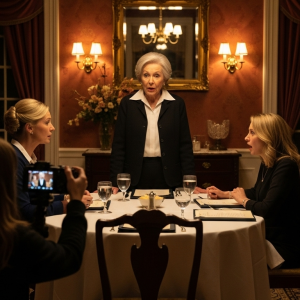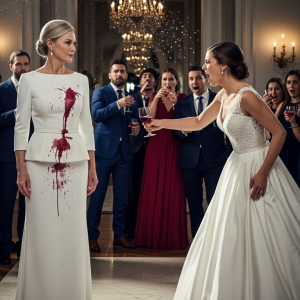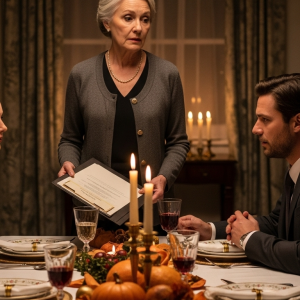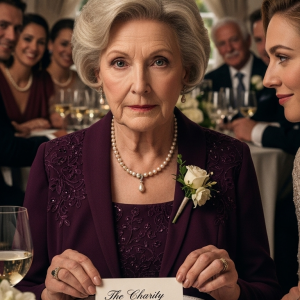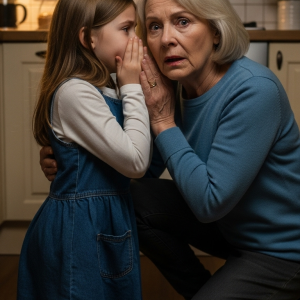She sat me by the kitchen. That’s where I watched my son get married, through the frantic swing of a service door, my view obscured by a tray of shrimp cocktail. I had paid for the wedding. Every flower, every chair, every ridiculously expensive, hand-calligraphed napkin. But when the music started and the toasts began, I wasn’t a part of it. Not even close.
There was no sign, no card, no nameplate to mark my place. Just a folding chair with a paper napkin tossed over the seat. That was my spot, wedged between a stack of used trays and a wheeled cart with a broken wheel that squeaked every time a waiter rushed by. I stood there for a few seconds, blinking hard, the thick, sour scent of marinara clinging to the steam that billowed from the kitchen doors.
I looked down at my dress, a soft mauve chiffon I’d had hand-stitched. I had spent three hours getting my hair done that morning, three hours pretending this day would be as special for me as it was for them. But no one had told me. No one said, “We’ve made other seating arrangements.” No one even looked at me when I arrived.
Not even Daniel. He was too busy smiling, adjusting his cufflinks, letting her mother kiss him on the cheek as if she’d been the one to stay up all night when he had terrors. As if she’d been the one who took double shifts when he needed braces, and I had to choose between paying the rent and paying for his perfect smile.
I clutched the little beige handbag he’d bought me years ago for Mother’s Day, back when he still called me Mama. My hands were shaking, a subtle vibration like an electrical current trying to escape. The catering manager, a boy who couldn’t be more than twenty, smiled awkwardly. “Uh, they said you were supposed to wait back here, ma’am. The bride didn’t want any… visual clashes with the theme.”
I stared at him. Theme? He winced, glancing toward the swinging doors as they banged open again. Laughter spilled in from the reception hall. “The silver and gold,” he mumbled. “Aesthetic consistency for the photos and all.”
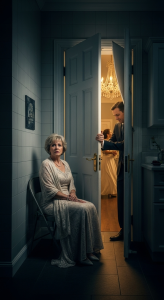
I sat down slowly. The chair creaked. There was a dark stain on the floor under my feet, maybe old gravy. I looked at my nails, freshly manicured in a soft pink, then at the cold chicken breast someone had dropped in front of me on a chipped white plate. The worst part was, I didn’t say a word. Because it was his day. Because I told myself, Don’t ruin this for him. Don’t be that mother.
I pulled out the program. Elegant cursive on cream cardstock. Her father walked her down the aisle. Her mother gave the first speech. There was no mention of me anywhere. I was just the purse string, the ghost in the kitchen, the woman no one wanted in the picture.
The door swung again. I caught a glimpse of the chandelier, the first dance, Daniel and Emily twirling under a soft, golden light. He didn’t look my way once. I pressed my napkin to my mouth, pretending to dab at a non-existent stain. My eyes burned. I told myself it was the onions from the kitchen. But it wasn’t. It was the betrayal. And somewhere deep inside me, something cracked quietly, like a hairline fracture in glass.
I could hear someone making a toast, probably her father. I leaned back just enough to catch a glimpse through the crack of the door. There they were, lined up in front of a ridiculous floral arch I’d paid a fortune for, sitting at the head table. My sister, Carol, and my cousin, Diane, sat two rows back. Neither of them looked toward the kitchen. No one did.
I wasn’t part of the show. I was a problem that had been solved with a folding chair and a door that swung shut.
A young waitress brushed past me. “Do you want a refill or anything?” she asked, her smile a mixture of pity and guilt. I shook my head. I wasn’t fine. Every inch of me ached—my feet, my shoulders, my jaw clenched so tight it throbbed. I hadn’t eaten since breakfast, but my stomach was a knotted fist.
I thought of the seating chart. I’d asked Emily about it weeks ago. She’d given me a tight, bright smile. “We’re still finalizing everything, Margaret. Don’t worry, you’ll be included.” I should have known then. Deep down, I knew I was being managed, moved around like a prop—invited for my checkbook, tolerated for the optics, but never truly wanted.
I heard Daniel laughing again, that deep, rumbling laugh from his childhood. And something rose in my chest. Not grief, not disappointment. It was rage. Quiet, controlled, devastating rage. I stood and pushed the door open just enough to peek through again. I locked eyes with Emily. She saw me. She knew exactly where I was, and she smiled. Not apologetically, but calmly, confidently. Then she turned back to her bridesmaids and laughed.
That was when I knew. This wasn’t a mistake. It was deliberate. And just like that, something inside me shifted. My place in their lives had been decided for me. I was done pretending I didn’t see it.
The speeches continued. Her father. Her mother. Not a word about me. No, Thank you for everything, Margaret. No, This day wouldn’t be possible without her. Nothing. I was an ATM, and my transaction was complete.
Then came Daniel’s speech. He stood at the mic, radiant in a tailored suit I had helped pay for. “I just want to thank everyone for being here,” he said, his voice polished. “Emily, you’ve made me the happiest man alive. And to your family, thank you for welcoming me like your own. I truly feel at home with you all.”
My name was never said. Not once. I had paid for the venue, the catering, the photographer, the linens, the custom neon sign. I had even paid for the dress Emily was wearing. And yet, I didn’t exist.
I waited until the last bite of dessert was served, until the music hit its peak. Then I walked out of the kitchen, straight past the bar, and out the side door into the cool, still air. I took out my phone. Three calls. One to the florist, one to the band, one to the bar manager. Polite, direct, no need for explanations.
My voice was steady and calm. And when I hung up, I didn’t feel guilt or regret. I felt the first flicker of something I hadn’t known in years: Power. Let them toast without me. Let them feel the gap, the absence. Let them ask questions. They had already erased me from the story. All I did was turn the page.
I didn’t sleep that night. I lay in the stiff hotel bed, still in my dress, the smell of kitchen grease clinging to my hair. Around 3 a.m., my phone buzzed. A message from my niece: What happened? Everyone’s freaking out. I ignored it and opened the wedding budget spreadsheet on my tablet.
I scrolled through the transactions and my breath caught. Two unauthorized charges made just days before the wedding. A bar tab from a “tasting event.” A spa day for the bridal party. My card. Used without my permission. Then I saw the note Emily had left on Venmo to one of her bridesmaids: “His mom is covering everything. Might as well go big! #WeddingVibes.”
I didn’t cry. I felt a strange, heavy nothingness, like my insides had gone numb. I went to the mirror. Mascara was smudged beneath my eyes, my mouth hardened into something unfamiliar. I looked like I had aged ten years in one night.
Then something shifted. I washed my face, sat down at the desk, and drafted three emails. One to the florist, one to the band, one to the bar vendor. All were polite, professional, and final. The payment balance is withheld. The second performance is not required. Please cancel the second shift.
It was dawn when I hit send. I wasn’t angry anymore. I was done. Done being convenient. Done being the wallet. Let them scramble. Let them remember the moment the music was cut off, the bar stopped pouring, and the flowers for the farewell brunch never arrived. And maybe, just maybe, they’d remember the woman in the kitchen who made it all possible in the first place.
The drive home was quiet. When I pulled into my driveway, I went straight to my bedroom, opened the dresser, and pulled out a red folder filled with old paperwork. At the bottom of the stack, beneath old insurance papers, was a letter. The envelope was yellowed, the date written in my late husband Michael’s handwriting, from the year he left me. I had never opened it. It had felt too painful. But now, I slid my finger under the flap.
Margaret, it began. I know you never wanted to hear from me again, but I need to tell you something. I’ve been carrying a secret, and I can’t take it to the grave. You deserve the truth.
My pulse quickened. Daniel… he isn’t biologically yours. I found out years ago he was the result of an affair his mother had. I thought I could pretend he was mine, that we could raise him together, but I was a coward. She didn’t want him. She was 18, terrified, and asked me to give him up for adoption. I couldn’t. So I lied to you. I told you he was ours. You believed me. You raised him. You loved him like he was flesh of your flesh. He was a stranger’s child, and you made him your world.
I stopped reading. The room spun. All those years, every scraped knee, every bedtime story, every night shift I took to buy him sneakers. I had built my life around a boy who was never mine to begin with, a gift from a man who abandoned us both.
I placed the letter on the bed and smoothed it with my palm. It didn’t feel like betrayal anymore. It felt like freedom. For my entire adult life, I had lived a version of myself that only existed in service to others: wife, mother, provider, ghost. Now, with that truth staring up at me, I saw something new. I had a power I didn’t even realize. I chose to stay when others ran. I made a family even when it wasn’t written in blood. And I could choose again. Starting now.
My phone buzzed. Daniel again. A long message, the tone different. I don’t know what happened. I’ve been thinking about everything. Emily said she didn’t mean to hurt you. I’m sorry if you felt excluded.
If I felt excluded. Not, I’m sorry we excluded you. It was still about his perception, his comfort, his distance from blame. I didn’t respond.
Instead, that evening, I took every framed photo of us off the walls. I boxed them gently, labeling the box: Memories, not obligations. I cooked dinner just for me—a lemon butter pasta I’d always wanted to try. I lit a candle, played soft jazz, and set the table for one. It was quiet, but not empty. It was the sound of reclaiming myself.
My new life started with a guest list, written on a simple yellow notepad. Not people I had to invite, but people I wanted to. Friends from work, my next-door neighbor, the kind woman from the local bookstore. No one shared my blood, but every one of them had made me feel seen in a way my own son never had.
The dinner wasn’t a holiday. It was just a gathering at my house, at my table. No folding chairs, no back kitchens. As my friends arrived, the house filled with laughter, with hugs that lasted longer than they needed to. We ate at the table I once used for helping Daniel with his math homework. Now it was full of passing plates and clinking forks.
This was family. Not assigned by blood, but chosen.
Toward the end of the evening, my friend Claire raised her glass. “To Margaret,” she said. “For being the kind of woman who reminds us that it’s never too late to take your seat at the head of your own table.” Everyone clinked glasses. And I knew she was right
The knock came a week after the wedding. Steady, insistent. I opened the door. Daniel stood there, the wedding glow gone, replaced by dark circles under his eyes. He noticed the empty spaces on the mantle where his pictures used to be.
“I don’t understand what happened,” he began. He didn’t ask how I felt. He didn’t say he was sorry. He wanted an explanation for my behavior.
I stood, walked to the closet, and pulled out a box. I set it on the coffee table between us. “Receipts,” I said. “Every one of them. The venue, the caterer, the extra dance floor you wanted. It’s all there.”
His eyes scanned the papers. Then I pulled out the next item: the letter. His father’s handwriting was unmistakable. I didn’t speak while he read it. I watched his face shift from confusion to a slow, creeping disbelief.
He looked up, his voice cracked. “You knew?”
“I do now,” I said.
He swallowed hard. “So you’re angry because… because I’m not—”
“I’m not angry because you’re not my biological son,” I said, cutting him off, my voice steady. “I’m angry because I raised you, Daniel. I gave you everything I had. And when the moment came for you to honor me, to simply acknowledge me, you sat down and stayed silent.”
He looked at the floor. “You let them push me into the kitchen. You watched them humiliate me, and you said nothing. That’s what broke me. Not your DNA.”
He finally spoke, barely a whisper. “I didn’t think it would matter. Emily said… she said it would be better for the pictures. I didn’t think you’d be hurt.”
“You didn’t think,” I said. “Exactly.” I stood and walked to the mantle, holding up an empty frame. “This held your kindergarten graduation photo. You ran off the stage straight into my arms. I’m done holding on to versions of you that no longer exist.”
“Mom—”
“No,” I said firmly. “I’m not your backdrop anymore. I’m not your bank. I’m not your afterthought.”
He nodded slowly, his jaw clenched. “I’m sorry,” he whispered.
“Too little. Too late.” I picked up the box and handed it to him. “These are yours now. Every receipt, every reminder of what you chose to overlook.” I walked him to the door. He paused, searching my face for a crack, a sign that it might open again later. It wouldn’t.
“You always said I was your whole world,” he said quietly.
“You were,” I replied. “And now, I’m finally mine.” Then I closed the door.
Daniel never called again. I didn’t need him to. The people who mattered were already in my life. The next morning, I woke up to birdsong and peace. I sat on my porch, looking out at my garden, where roses bloomed wild and bright.
I wasn’t someone’s backdrop anymore. I was the main character in my own story.
At my next dinner party, surrounded by the warmth of chosen family, I stood to make a toast. My hands didn’t shake. My voice didn’t tremble. I looked at every face around that table—people bound to me not by obligation, but by love and respect.
“To the mothers who stayed quiet for too long,” I began. “To the women who gave everything and were told it still wasn’t enough. To the ones who were asked to sit in the kitchen after building the damn house. This is for us.” I raised my glass higher. “May we never sit down again, unless it’s at the head of our own table.”
Glasses clinked. Someone cheered. And I sat down. Not in the back, not out of sight, but in my chair, in my place. And finally, finally, that was enough.
